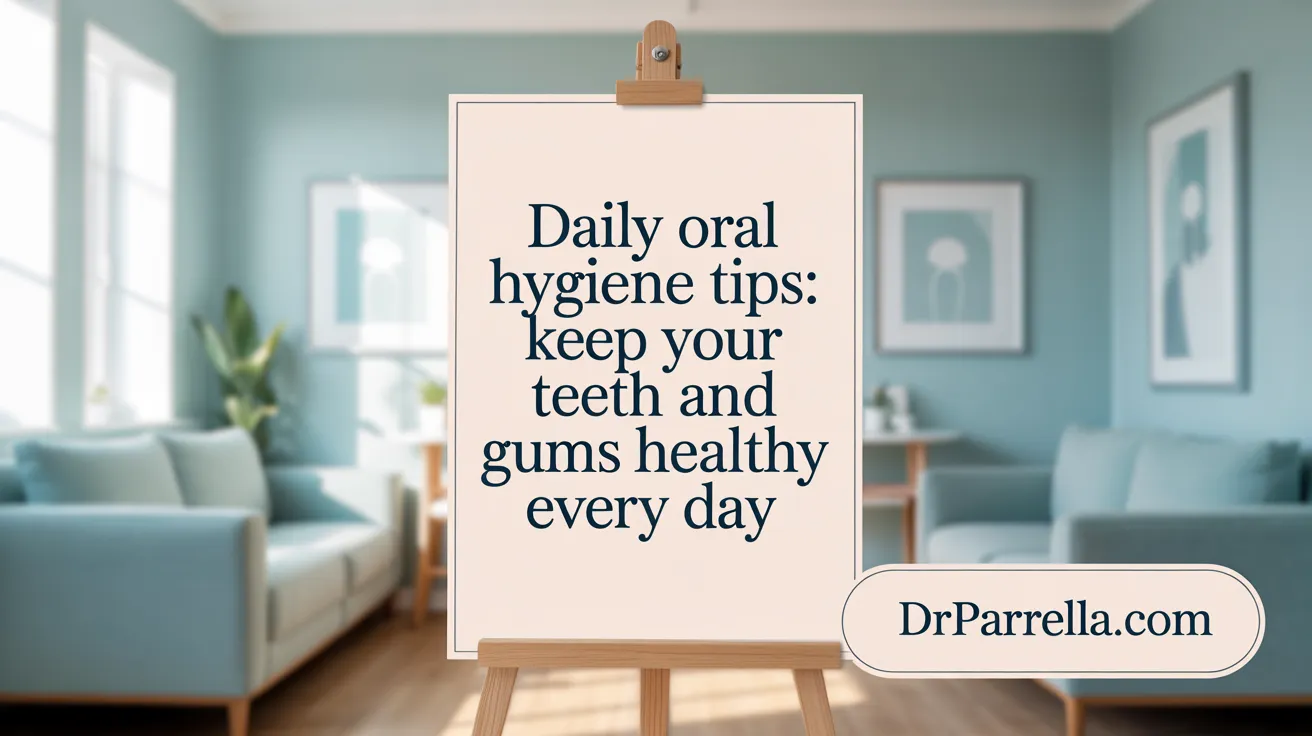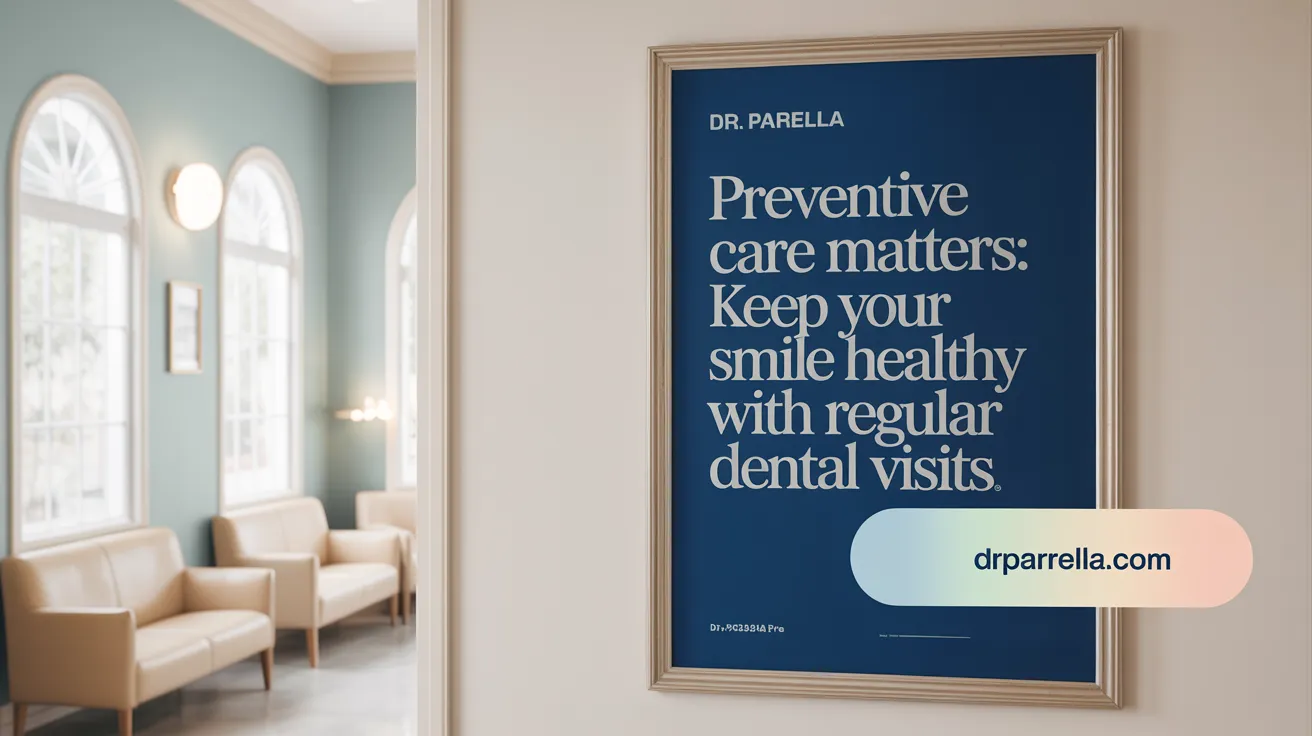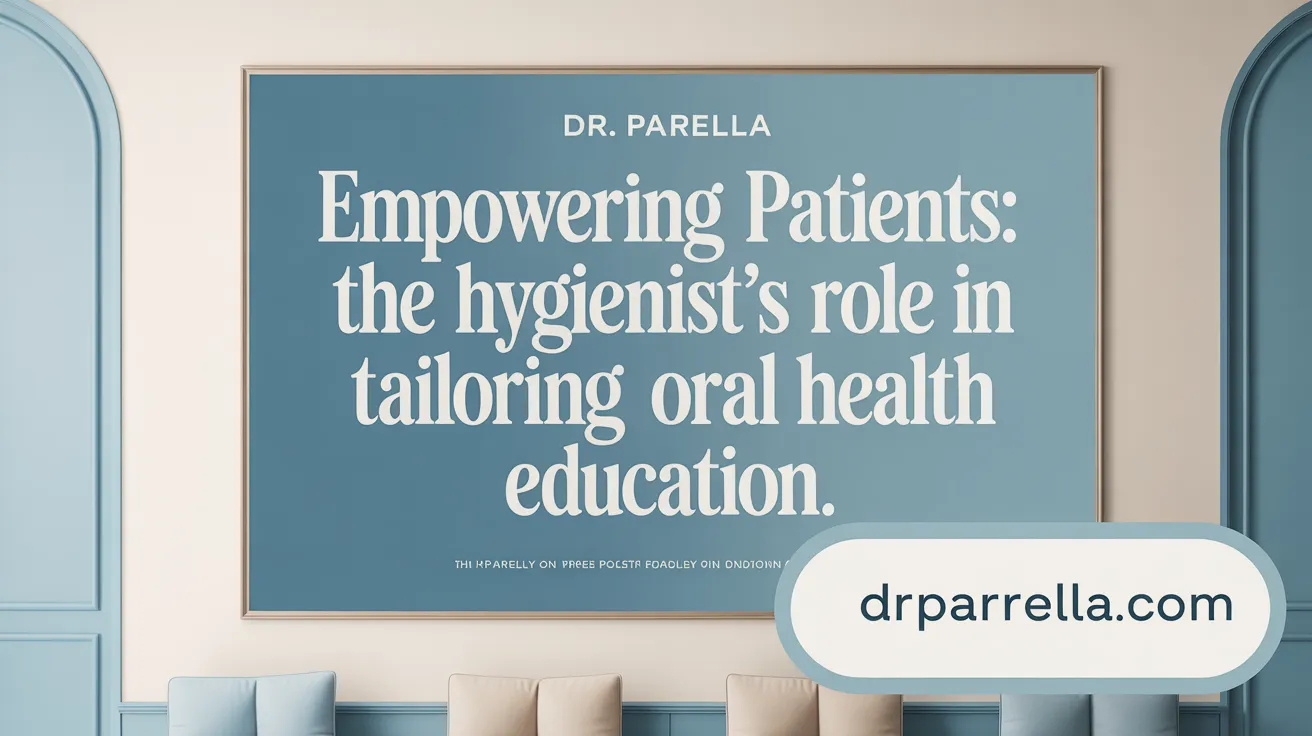Why Dental Hygienists Stress Consistent Oral Care
Importance of regular oral hygiene
Consistently practicing good oral hygiene—brushing twice daily with fluoride toothpaste and flossing once daily—is essential to prevent cavities, gum disease, and other oral health issues. Regular care removes plaque and bacteria, which are the root causes of tooth decay and gum infection. Maintaining this routine helps adults avoid oral pain and more serious conditions like tooth loss and oral cancer.
Role of dental hygienists in oral health education
Dental hygienists play a critical role in educating patients on effective oral care techniques. They demonstrate proper brushing angles, flossing methods, and recommend suitable oral hygiene products. Their guidance encourages patients to adopt and maintain healthy habits. Hygienists also perform professional cleanings and screenings, detecting problems early and personalizing care plans to individual needs.
Benefits of maintaining oral health year-round
Year-round oral care protects not only oral health but overall wellbeing. Healthy teeth and gums make eating and speaking easier and reduce risks linked to systemic diseases like heart disease and diabetes. Regular oral care also supports fresher breath, better appearance, and fewer costly dental treatments. Hygienists emphasize that even during busy or seasonal times, sticking to daily care habits and dental visits preserves a vibrant, healthy smile for life.
Fundamentals of Daily Oral Hygiene Recommended by Hygienists

Core daily oral hygiene practices advised by dental hygienists
Dental hygienists stress the importance of brushing teeth twice a day for two minutes each session. Use a soft-bristled toothbrush with fluoride toothpaste, angling the bristles at 45 degrees toward the gumline to effectively remove plaque without harming sensitive gum tissue.
The importance and method of flossing
Daily flossing is crucial because it cleans the areas between teeth where a toothbrush cannot reach. Use about 18 inches of floss, wrapping it around the middle fingers and guiding it in a gentle C shape around each tooth to remove plaque and trapped food particles.
Role of tongue cleaning
Cleaning the tongue every day helps reduce bacteria that accumulate there, which can cause bad breath and contribute to oral health problems. This can be done using a toothbrush or a tongue scraper.
Use and benefits of antibacterial mouthwash
Using an alcohol-free antibacterial mouthwash daily can further decrease plaque and harmful bacteria, supporting gum health and fresher breath without the dryness caused by alcohol-based rinses.
Understanding the ADA Seal of Acceptance
Selecting products bearing the American Dental Association (ADA) Seal of Acceptance is recommended. This seal ensures the product has been scientifically tested for safety and efficacy, giving patients confidence in their oral care choices.
Impact of hydration and diet on oral health
Staying hydrated promotes saliva production that naturally neutralizes acids and cleanses the mouth, preventing dry mouth and decay. Limiting sugary foods and drinks is essential to reduce the risk of cavities since sugar fuels harmful oral bacteria (oral hygiene basics).
Following these comprehensive daily practices can help maintain healthy teeth and gums, contributing not only to oral wellness but overall health as well.
Preventive Care and the Importance of Regular Dental Visits

Why do dental hygienists stress regular dental visits?
Regular dental visits, usually recommended every six months, are essential for maintaining oral health. During these visits, dental hygienists perform professional cleanings that remove plaque and tartar buildup that daily brushing and flossing cannot eliminate. This helps prevent cavities and gum disease.
Role of dental cleanings and examinations
Professional cleanings by dental hygienists help keep teeth and gums healthy by controlling plaque and preventing inflammation. Routine examinations allow hygienists and dentists to identify early signs of oral health problems, including cavities, gum disease, and oral cancer.
Early detection of cavities, gum disease, and oral cancer
Dental examinations and X-rays enable early detection of issues that might not be visible or cause symptoms yet, such as hidden cavities or gum infections. Oral cancer screening methods during checkups is vital, especially for adults over 40 or those with risk factors like tobacco and alcohol use.
Frequency of visits tailored to risk
The ideal frequency of dental visits varies depending on individual risk factors. While twice a year is standard, people with chronic diseases, history of gum disease, or other oral health concerns may need more frequent appointments. See preventive measures for oral health, especially if affected by systemic health issues.
Benefits of continuity with the same hygienist
Seeing the same dental hygienist regularly builds trust and allows for personalized care. Hygienists can monitor changes in your oral health over time and adjust treatment plans, improving outcomes as detailed in the crucial role of dental hygienists in your oral health.
Dental X-rays and impressions
Dental X-rays help detect tooth decay, bone loss, and other abnormalities that cannot be seen during a visual exam. Dental hygienist dental impressions taken by hygienists assist in planning restorative treatments or creating appliances like dentures or mouthguards.
Regular professional dental care complements Proper oral hygiene essentials, reducing the risk of serious dental problems and supporting overall oral health for all ages.
Addressing Oral Health Challenges Across Lifespan and Conditions
How do dental hygienists advise maintaining oral health during pregnancy and aging?
Dental hygienists provide specialized guidance to protect oral health during pregnancy and aging. Pregnant women are at higher risk for cavities and gum disease due to hormonal changes. Hygienists recommend brushing twice daily with fluoride toothpaste and daily flossing to control plaque and prevent inflammation. They stress the importance of dental visits before delivery to manage any developing issues and reduce risks to both mother and baby.
For older adults, maintaining oral health can be more challenging due to factors such as decreased saliva production, receding gums, and limited dexterity. Hygienists suggest cleaning dentures daily and removing them at night to prevent infections and irritation. They also encourage the use of adaptive tools like electric toothbrushes and floss holders to aid effective hygiene in cases of arthritis or reduced hand strength. Caregivers play a vital role in assisting older adults who need help with daily hygiene routines.
Managing dry mouth, a common side effect of many medications, is another focus. Dental hygienists advise staying well hydrated and chewing sugarless gum to stimulate saliva flow. Patients should inform their healthcare providers about dry mouth symptoms, as medications can sometimes be adjusted to reduce this effect. See more about the impact of hydration on saliva production.
Chronic diseases such as diabetes, arthritis, and heart disease elevate the risk of oral problems, including gum disease and tooth loss. Hygienists emphasize that controlling these conditions alongside consistent oral care—brushing, flossing, and regular dental visits is essential to maintaining oral and overall health.
Together, these comprehensive strategies by dental hygienists help adults navigate oral health challenges through life changes and health conditions, fostering lasting wellbeing and comfort.
The Holistic Link Between Oral Health and Overall Well-being
What is the relationship between oral hygiene and overall health?
Good oral health is not just about maintaining a bright smile; it plays a vital role in your overall well-being. The mouth serves as a gateway to the digestive and respiratory tracts, meaning that infections originating in the mouth can affect your entire body. Learn more about the oral health and overall health connection.
Dental professionals explain that poor oral hygiene can lead to conditions like gum disease, which is linked to systemic health issues such as cardiovascular disease, diabetes, pregnancy complications, pneumonia, and may even contribute to Alzheimer’s disease. This connection highlights the importance of taking care of your teeth and mouth daily.
How does oral hygiene help prevent systemic health problems?
Regular brushing twice daily with fluoride toothpaste and flossing remove plaque and bacteria that cause decay and gum infections. Keeping the mouth clean helps prevent chronic inflammation and infection that may contribute to broader health problems. For guidance on proper oral hygiene essentials, including daily brushing and flossing, see these recommendations.
Seeking professional dental care for routine checkups and cleanings also supports early detection of oral diseases that could have systemic effects. Managing dry mouth and controlling chronic illnesses like diabetes are important complementary steps. More on oral health during pregnancy and chronic diseases affecting oral health can be found here.
What role do tobacco, alcohol, and HPV play in oral cancer risk?
Tobacco use remains one of the greatest risk factors for gum disease and oral cancers. Limiting tobacco entirely is crucial for oral and overall health. See advice on avoiding tobacco products. Moderate alcohol consumption is advised, as excessive use increases risks of head and neck cancers. Learn about alcohol and oral cancer risk.
Vaccination against human papillomavirus (HPV) can reduce the risk of certain oral and throat cancers. Together, these lifestyle choices markedly lower your chances of developing oral malignancies. For more, see HPV vaccination and oral cancer prevention.
How does diet influence oral and general health?
Limiting added sugars in foods and beverages is essential to protect teeth from decay. Sugars feed harmful bacteria that produce acids eroding tooth enamel and triggering inflammation. Explore advice on reducing added sugars and healthy diet impact on oral health.
A balanced diet rich in fruits, vegetables, whole grains, and lean proteins supports oral tissue health and systemic wellness. Drinking fluoridated water further strengthens teeth and helps prevent cavities.
Maintaining this holistic approach—good oral hygiene, healthy lifestyle choices, and professional care—promotes both a vibrant smile and robust overall health.
Practical Tips from Hygienists for Year-Round Oral Care Maintenance
What practical advice do dental hygienists give to maintain oral health throughout the year?
Dental hygienists emphasize the importance of maintaining consistent oral hygiene routines all year long. Brushing at least twice daily for two minutes with fluoride toothpaste and flossing daily remain foundational, even during holidays or busy travel periods. To encourage children to brush for the full two minutes, parents can use timers or fun songs for brushing.
Protecting your smile during sports activities is also key. Custom sports mouthguards help prevent tooth damage from contact or impact injuries (Maintaining oral health year-round).
When traveling, packing a dental kit with toothbrush, toothpaste, floss, and mouthwash ensures uninterrupted care (Holiday Dental Care Tips). Hygienists suggest using flavored floss, floss picks, or water flossers to make oral hygiene easier and more enjoyable for both children and seniors (Dental hygienists' role in preventive care).
Limiting sugary holiday treats and promptly brushing or rinsing after consuming sweets helps reduce the risk of cavities (Maintaining oral hygiene during fall. Staying hydrated supports saliva production, which naturally protects teeth (impact of hydration on saliva production).
Being prepared for dental emergencies by having emergency contacts and first-aid dental supplies ready can minimize complications (Holiday dental care tips.
Regular dental visits scheduled before and after high-risk periods such as holidays provide professional cleanings, early issue detection, and personalized advice to keep smiles healthy year-round (Dental hygienists' role in preventive care.
The Role of Dental Hygienists in Educating and Motivating Patients

How do dental hygienists support patients in adopting and maintaining good oral health habits?
Dental hygienists play an essential role in helping patients achieve and sustain healthy oral care routines. They start by creating personalized treatment plans that address each individual's unique oral health needs, factoring in lifestyle, risk factors, and personal preferences. This tailored approach helps patients feel supported and more capable of managing their oral health.
Educational strategies are adjusted based on the patient’s readiness to change. Using behavioral frameworks such as the stages of change model and other behavioral frameworks in dental hygiene education, hygienists can recognize where a patient stands—from precontemplation to maintenance—and adjust their guidance accordingly. This patient-centered method fosters gradual, sustainable adoption of better habits.
Clear and compassionate communication is vital. Hygienists explain oral health conditions in simple terms; for example, describing gingivitis as a bacterial infection makes the issue more tangible and actionable for patients. They also provide detailed instructions on using oral hygiene products—when and how to use them, proper amounts, and techniques—ensuring patients understand how to care for their teeth and gums effectively.
Promoting evidence-based products, especially those with the American Dental Association (ADA) Seal of Acceptance, ensures safety and effectiveness. Hygienists recommend products like fluoride toothpaste, antibacterial mouth rinses, and appropriate floss or interdental cleaners suited to the patient’s needs.
Building trust through a comfortable and supportive environment during dental visits is key. When patients feel listened to and valued, they are more likely to follow through with oral care recommendations. Continuity of care with the same hygienist also helps monitor progress and adapt advice, reinforcing positive behaviors for long-term oral health maintenance.
Commit to Year-Round Oral Health with Hygienist Guidance
Maintain Consistent Oral Health Habits
Good oral health requires daily commitment. Brushing twice daily with fluoride toothpaste and flossing once a day remove plaque and protect your teeth and gums. Don't forget to clean your tongue to reduce bacteria and freshen your breath. Limiting sugary foods and drinks, staying hydrated, and using mouthwash can further support oral wellness.
Seek Professional Support from Hygienists
Dental hygienists play a vital role in preventive care. Regular visits—usually every six months—allow for professional cleanings and early detection of issues like cavities and gum disease. Hygienists also offer personalized advice, helping you master effective brushing, flossing techniques, and selecting the right oral care products.
Proactive Oral Care Benefits Your Whole Health
Maintaining your oral health contributes to overall wellness. Poor oral hygiene is linked to systemic conditions such as heart disease, diabetes, and respiratory infections. Taking charge of your dental care not only safeguards your smile but supports your general health and quality of life throughout the year.
